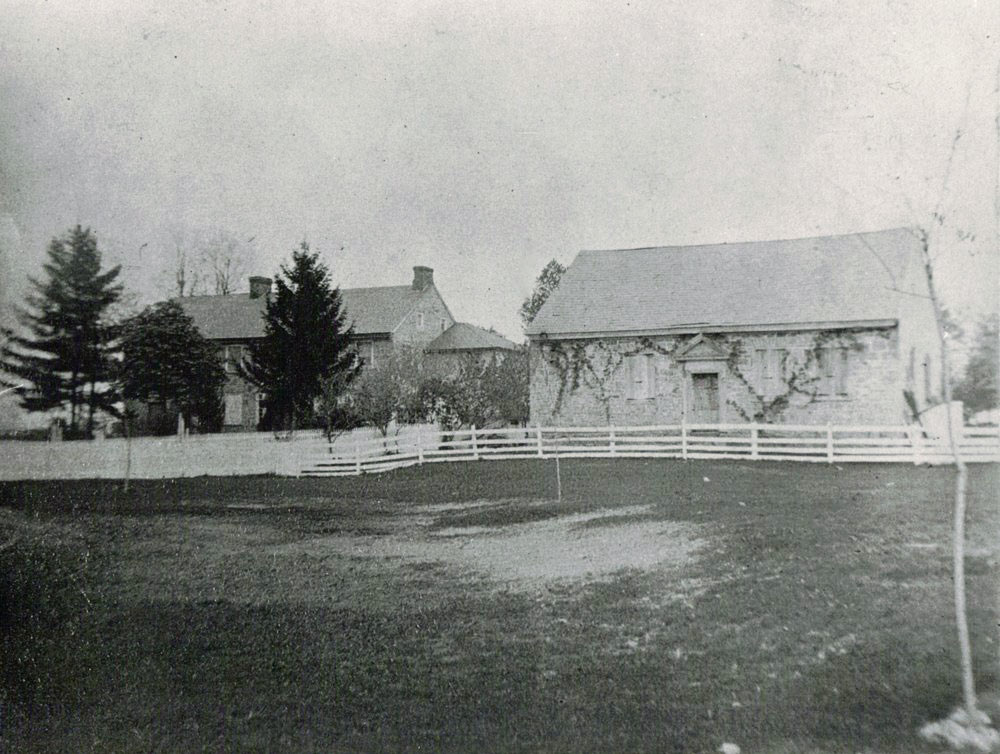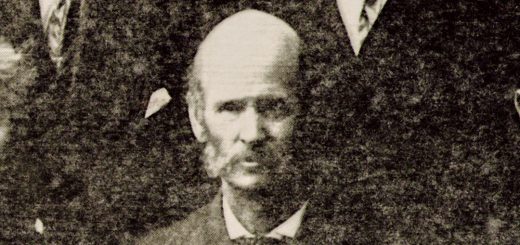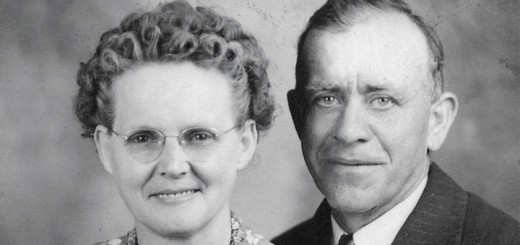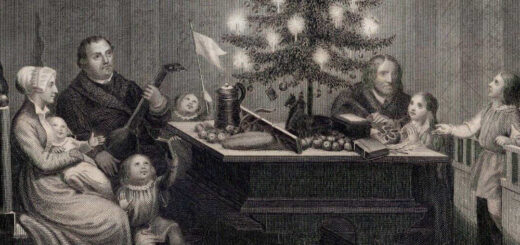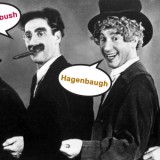The Franklin Society: Arguing for Fun in the Early 1800s
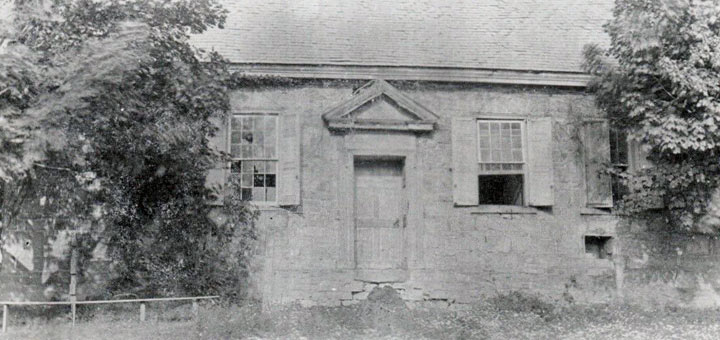
The Franklin Society was formed in late December of 1807 in Northampton County, Pennsylvania. Andrew Hagenbuch (b. 1782), who was the son of Christian (b. 1747) and grandson of Andreas (b. 1715), was one of its early members along with other locals such as James Horner, Sr., John Moore, Henry Epple, William Randal, D.M. MacGregor, and John Weaver.
The stated goal of the society was to meet and debate important questions of the day, ostensibly for learning the art of rhetoric and for amusement. As recorded in the first minutes dated December 19, 1807:
A number of gentlemen having met in the Collossaucon schoolhouse, for the purpose of forming themselves into a Polemical Society; Mr. John Weaver was chosen Chairman, and John Moore appointed Secretary. The meeting, after maturely considering the business, were of the opinion that it was laudable and commendable, and not only so, but highly, useful—to young gentlemen in particular-—as it is a means of acquiring learning and information, and the best method of dispelling the fear and awkward bashfulness which some men are troubled with in speaking before a public assembly.
The society’s constitution further states its mission and gives it an official name:
Whereas we, the subscribers, having taken into view the advantages resulting from a well regulated Polemical Society, as it has a tendency to incite the members to reading and meditation, and to improve in them, that useful and ornamental art of Eloquence, by a free and liberal discussion of various interesting subjects of debate, of a moral, political, and philosophical tendency; now therefore, we, in order to avail ourselves of these as well as the many other advantages arising therefrom, do form ourselves into a society of the foregoing description, under the name and style of Franklin Society…
The Franklin Society was formed as winter approached, likely because there was less farm work to be done during the colder months. Membership cost twelve and a half cents to join and another six cents per month while a member was active.
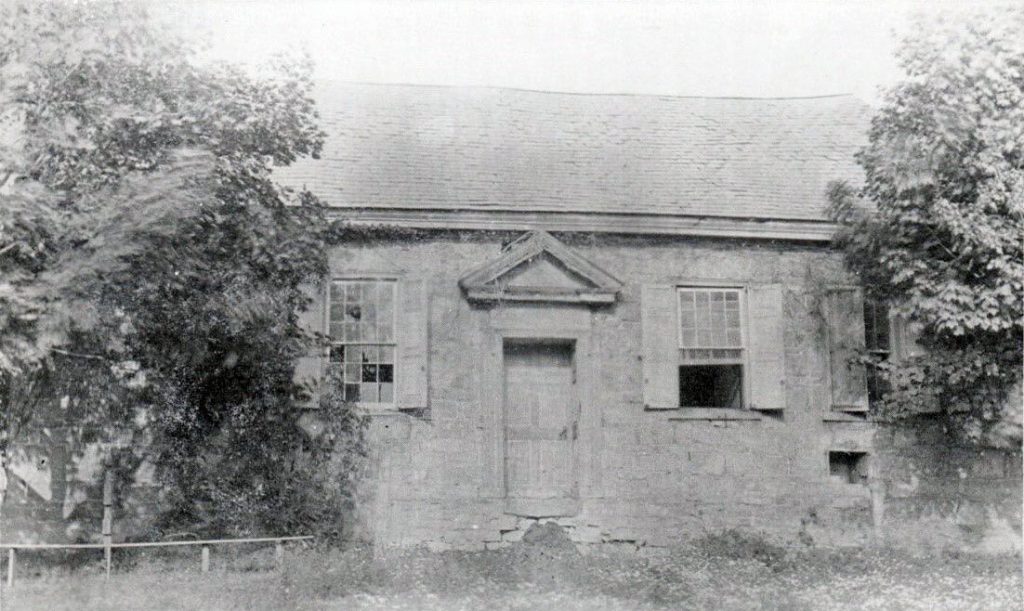
Some Franklin Society meetings were held at the Academy at Monocacy Creek, which was in significant disrepair by the 1920s.
Debates were held on Saturday evenings each week. During a meeting, a single question was argued by two teams: the Respondent and the Opposition. Each team took a different side of the question being debated. At the end of the night, a vote was put to the members present, selecting the side that had been the most convincing.
The first question chosen for debate was:
Which is the most censurable: the Merchant who brings in slaves, or the Farmer who buys them?
Members of both teams prepared a speech to defend their position or attack the other. Minutes from the proceedings show that authors could be quoted in a speech, but could not be read from entirely. Members arguing that the Merchant was at fault included John Moore, James Horner, Sr., and William Randal, while John Weaver, James Horner, Jr., and Andrew Hagenbuch argued fault should be placed upon the Farmer.
After a lively debate, including opposing arguments made by father and son Horner, the minutes show:
[It was] decided that the Merchant was the most censurable, by a majority of three votes.
Discussions were held by candlelight, and according to the society’s rule, no one was permitted to smoke after the meeting began. Furthermore, anyone absent without a proper excuse, such as illness, would be fined upwards of twelve and a half cents.
On January 2, 1808, a new question was argued:
Which has the greatest influence over men, Women or Wine?
The meeting minutes note that:
[The question] was then debated with much eloquence, and decided that women have the greatest influence, by a majority of thirteen out of fourteen votes.
It is not recorded which member voted in favor of wine being the greater influence, though it is known that Andrew Hagenbuch and his father, Christian, ran a local distillery!
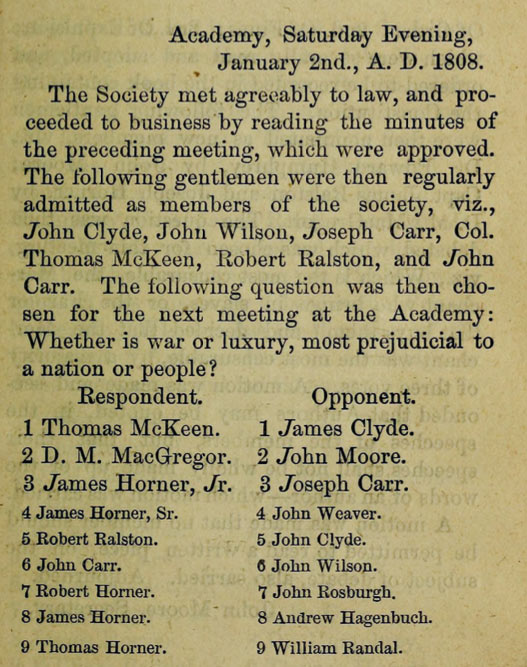
Portion of the minutes from the Franklin Society. Transcribed in “Genealogies, Necrology, and Reminiscences of the Irish Settlement” by Rev. John C. Clyde, 1879
Over the next few weeks, new members joined the Franklin Society. Many were notable within the community. The meeting minutes recorded these including Dr. Edward Humphrey, Captain James Ralston, Captain Michael Weaver, Major John Palmer, and Colonel Thomas McKeen.
On January 23, 1808 a new question was argued:
Whether has the discovery of the Continent of America been an advantage or disadvantage to mankind in general?
For which it was decided that:
[T]he discovery of America has been an advantage to mankind in general, by a majority of four votes out of twelve in all.
Meetings alternated between the Collossaucon schoolhouse and the Academy at Monocacy Creek. Currently, no evidence has been found of where the Collossaucon schoolhouse stood. Although, it may have been located near the mouth of the Saucon Creek along the Lehigh River in what is today Bethlehem, Pennsylvania.
The Academy, on the other hand, is still standing. Positioned about a mile south of Bath, Pennsylvania, the Academy has been renamed the Wolf Academy in honor of Pennsylvania Governor George Wolf (b. 1777, d. 1840) who attended school there as a boy. It is maintained by the Governor Wolf Historical Society.
Interestingly, the Wolf Academy is located beside the home of James Ralston. This structure was built in 1795 and was later owned Colonel Thomas McKeen. Both men were members of the Franklin Society. Like the Wolf Academy, the Ralston-McKeen is operated by the Governor Wolf Historical Society.
On January 30th the society met at the Academy and discussed the following question:
Whether is war or luxury most prejudicial to a nation or people?
And it decided in a close vote that:
[W]ar is the most prejudicial, by a majority of two votes —yeas eight, nays six.
On February 13th a different question was debated:
Whether is Republican government, such as the United States, or Monarchical, such as the English, the most beneficial to any people or nation?
Not surprisingly results were unanimously in favor of the Republican government:
[I]n favor of a Republican: James Clyde, James Horner, Jr., Robert Horner, John Clyde, Thomas McKeen, Robert Ralston, Hugh Wilson, James Horner, [Sr.], D. M. MacGregor. In favor of a Monarchy: none.
Expulsions from the Franklin Society did happen, and according to their constitution this could occur for excessive absences. In fact, on February 27, 1808 it is recorded that:
By a motion, it was unanimously agreed that William Randal’s name be erased in the books of this society, as having by his conduct, entirely forfeited the confidence of mankind.
On March 5th, a new question was argued:
Whether is Agriculture, or Commerce, the most beneficial to the United States?
And a unanimous decision arrived at, with one member refusing to cast a vote:
The question concerning agriculture and commerce was decided, unanimously, in favor of agriculture. The voters were James Horner, Sr., James Clyde, James Horner, Jr., John Moore, Robert Horner, Andrew Hagenbuch, Joseph Kerr, Thomas Horner. D.M. MacGregor refused to vote.
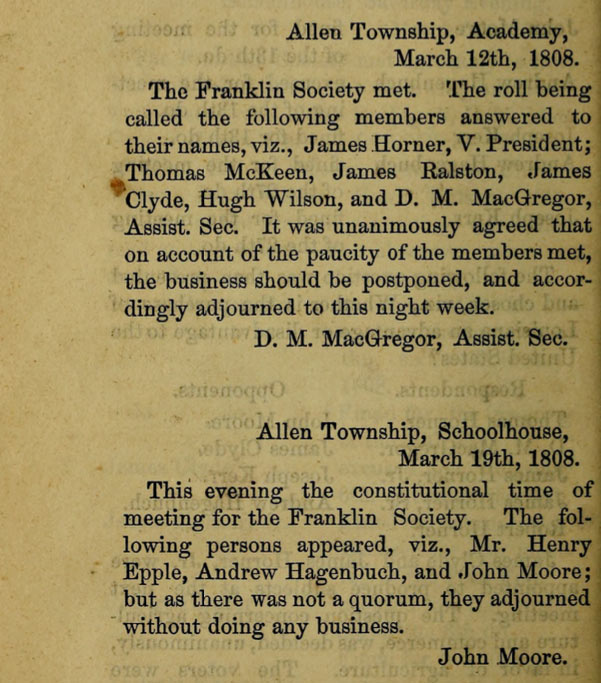
Portion of the transcribed minutes from the Franklin Society. Transcribed in “Genealogies, Necrology, and Reminiscences of the Irish Settlement” by Rev. John C. Clyde
By March, the Franklin Society’s minutes indicate that meeting attendance was declining. This may have been due to the coming of spring and the farm work to be done, or perhaps, it was simply because of lack of interest. Whatever the case, on April 16, 1808 it was recorded:
This evening [at] the appointed time of meeting for the Franklin Society, it rained so excessively that there was not a quorum appeared, and as it had been contemplated by the society to adjourn the society at this meeting through the summer season, to meet again in the fall, the society of course stood adjourned indefinitely.
Nevertheless, when the Franklin Society met in the fall, only three members were in attendance:
Collossaucon,
December 5th, 1808.
The Franklin Society being duly notified to meet on the evening of the 5th of this instant, appeared Mr. Henry Epple, Andrew Hagenbuch, and John Moore, and on account of there not being a quorum, they adjourned without doing any business. They much regret however, the want of spirit, and the inactivity of the members generally, by which the Society, which might have been made respectable and useful, has been altogether contemptible, and is now falling into dissolution.
After this meeting, the society appears to have disbanded, and in doing so, left several proposed questions unanswered. These were:
Which would be the most beneficial to the United States, in case of a war, the Militia, or a Standing army?
Whether is the cow kind, or sheep kind, most useful to mankind?
Whether is the purchase of Louisiana an advantage or disadvantage to the United States?
Though short-lived, the Franklin Society can tell us a great deal about American thought in the early 1800s. The economy (agriculture versus commerce), the military, expansionism (the Louisiana Purchase), and the wrongs of human slavery were all important topics to people.
One misconception of our ancestors is that they were simple folk, who worked with their hands and not with their minds. The Franklin Society demonstrates that, to the contrary, they were people who valued learning and dedicated time to thoughtful debate and personal education.
It’s worth contrasting this to the present day, where television talking points and social media posts are the preferred tools of public discourse.
Learn more about visiting the Wolf Academy and Ralston-McKeen house by visiting the Wolf Academy Historic Site.

